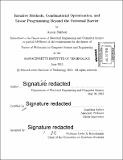| dc.contributor.advisor | Jonathan Kelner. | en_US |
| dc.contributor.author | Sidford, Aaron Daniel | en_US |
| dc.contributor.other | Massachusetts Institute of Technology. Department of Electrical Engineering and Computer Science. | en_US |
| dc.date.accessioned | 2015-11-09T19:52:53Z | |
| dc.date.available | 2015-11-09T19:52:53Z | |
| dc.date.copyright | 2015 | en_US |
| dc.date.issued | 2015 | en_US |
| dc.identifier.uri | http://hdl.handle.net/1721.1/99848 | |
| dc.description | Thesis: Ph. D., Massachusetts Institute of Technology, Department of Electrical Engineering and Computer Science, 2015. | en_US |
| dc.description | Cataloged from PDF version of thesis. | en_US |
| dc.description | Includes bibliographical references (pages 256-266). | en_US |
| dc.description.abstract | In this thesis we consider fundamental problems in continuous and combinatorial optimization that occur pervasively in practice and show how to improve upon the best known theoretical running times for solving these problems across a broad range of parameters. Using and improving techniques from diverse disciplines including spectral graph theory, numerical analysis, data structures, and convex optimization we provide the first theoretical improvements in decades for multiple classic problems ranging from linear programming to linear system solving to maximum flow. Key results in this thesis include the following: -- Linear Programming: We provide the first general improvement to both the running time and convergence rate of polynomial time algorithms for solving linear programs in over 15 years. For a linear program with constraint matrix A, with z nonzero entries, and bit complexity L our algorithm runs in time [mathematical formula] -- Directed Maximum Flow: We provide an [mathematical formula] time algorithm for solving the-maximum flow problem on directed graphs with m edges, n vertices, and capacity ratio U improving upon the running time of [mathematical formula] achieved over 15 years ago by Goldberg and Rao. -- Undirected Approximate Flow: We provide one of the first almost linear time algorithms for approximately solving undirected maximum flow improving upon the previous fastest running time by a factor of [mathematical formula] for graphs with n vertices. -- Laplacian System Solvers: We improve upon the previous best known algorithms for solving Laplacian systems in standard unit cost RAM model, achieving a running time of [mathematical formula] for solving a Laplacian system of equations. -- Linear System Solvers: We obtain a faster asymptotic running time than conjugate gradient for solving a broad class of symmetric positive definite systems of equations. * More: We improve the running time for multiple problems including regression, generalized lossy flow, multicommodity flow, and more. | en_US |
| dc.description.statementofresponsibility | by Aaron Sidford. | en_US |
| dc.format.extent | 266 pages | en_US |
| dc.language.iso | eng | en_US |
| dc.publisher | Massachusetts Institute of Technology | en_US |
| dc.rights | M.I.T. theses are protected by copyright. They may be viewed from this source for any purpose, but reproduction or distribution in any format is prohibited without written permission. See provided URL for inquiries about permission. | en_US |
| dc.rights.uri | http://dspace.mit.edu/handle/1721.1/7582 | en_US |
| dc.subject | Electrical Engineering and Computer Science. | en_US |
| dc.title | Iterative methods, combinatorial optimization, and linear programming beyond the universal barrier | en_US |
| dc.type | Thesis | en_US |
| dc.description.degree | Ph. D. | en_US |
| dc.contributor.department | Massachusetts Institute of Technology. Department of Electrical Engineering and Computer Science | |
| dc.identifier.oclc | 927413462 | en_US |
